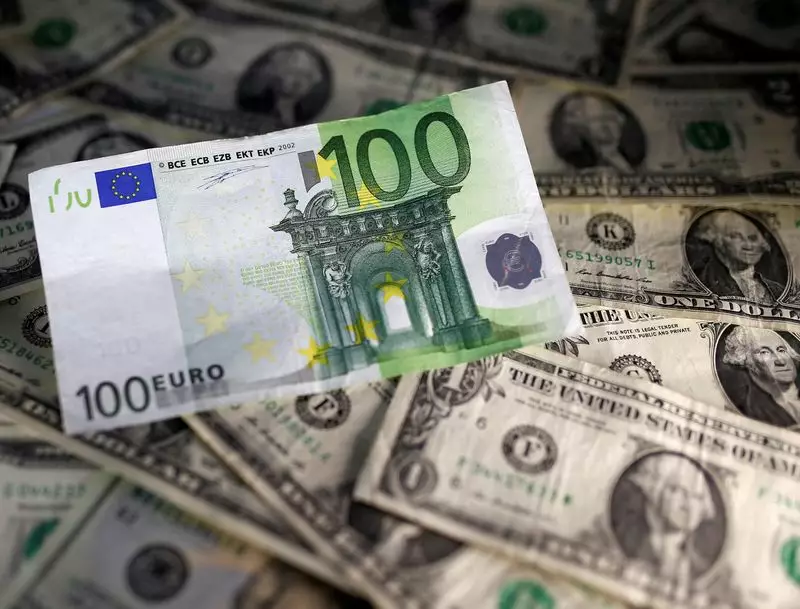In a dramatic turn of events, the euro is experiencing heightened pressures following the anticipated collapse of the French government. This political crisis looms ominously over the eurozone, particularly affecting France, which is the second-largest economy in the region. Analysts have noted that the fallout from a recent no-confidence vote against the French government will likely have pronounced repercussions. Uncertainty is hanging over the nation’s political landscape, leading to concerns about legislative effectiveness and the ability to manage an already challenging budget deficit.
The euro traded at $1.052175, a figure that sits perilously close to its two-year low of $1.03315. This situation indicates a cautious approach among traders, who are bracing for protracted instability in France’s political environment. Charlotte de Montpellier, an economist at ING, emphasizes that political turbulence is detrimental to both business and consumer confidence. With calls for a new prime minister amidst the chaos, it is likely France will remain devoid of stable governance in the foreseeable future, potentially lasting weeks or even months.
With the negative sentiment surrounding the euro, the role of the European Central Bank (ECB) is being scrutinized closely. Recently, ECB President Christine Lagarde hinted at financial stability being integral to price stability, but she refrained from offering concrete assurances of intervention to alleviate France’s market instability. The outlook for the eurozone’s economic growth remains bleak, and traders are anticipating a substantial rate cut as early as next week, with projections suggesting a potential easing of 157 basis points by the end of 2025. This highlights a broader concern regarding monetary policy and its capacity to foster economic recovery amidst ongoing geopolitical risks.
The precarious political landscape in France is compounded by lagging economic indicators, raising fears among investors. As the dull economic forecast looms, the ECB faces immense pressure to navigate the stormy waters and support member nations in distress.
In stark contrast to the euro’s troubles, Bitcoin has surged beyond $100,000 for the first time, driven by a combination of market factors that suggest a favorable climate for cryptocurrencies. The digital currency, known for its volatility and speculative nature, has markedly increased in value since November, reflecting widespread investor optimism that the recently elected Donald Trump may foster a regulatory environment more accommodating to cryptocurrencies. Analysts note that Bitcoin reached an impressive high of $101,626 during Asian trading hours, signaling a year-to-date increase of 138%.
Kyle Rodda from Capital.Com remarks on Bitcoin’s potential for sustained upward momentum. He cites the diminishing regulatory risks, the allure of non-fiat assets amidst increasing perceptions of fiscal irresponsibility in the U.S., and heightened geopolitical tensions as tailwinds that could propel Bitcoin prices even higher. This meteoric rise in cryptocurrency prices contrasts sharply with the challenges faced by traditional currencies, indicating a fundamental shift in how investors allocate their capital in times of uncertainty.
The current landscape of global currencies illustrates a dichotomy between the stability of fiat currencies and the burgeoning appeal of cryptocurrencies. With the South Korean won stabilizing amid local political upheaval and the Japanese yen showing minor strength as traders speculate about possible interest rate hikes, the overall mood remains cautious. The South Korean economy has faced its own turmoil, exemplified by President Yoon Suk Yeol’s controversial decision regarding martial law and a subsequent impeachment proposal, which left the won at near two-year lows against the dollar.
In the United States, investor sentiment remains focused on the upcoming non-farm payrolls report, which is likely to underline potential weaknesses in the economy. Fed Chair Jerome Powell’s comments regarding a stronger-than-anticipated economy may reflect an evolving monetary policy stance, with markets pricing in considerable speculation about a rate cut. Currently, there is a 74% probability assigned to a 25-basis-point rate cut, indicating that officials remain agile in their responses to economic disconnects.
As the eurozone grapples with political instability and economic malaise, the allure of cryptocurrencies such as Bitcoin appears to intensify. The contrasting trajectories of these financial instruments showcase the complex dynamics at play in global markets. Investors, caught between uncertainty and opportunity, will need to navigate these turbulent waters with a keen eye on evolving conditions both in the eurozone and the broader global economy.
The future remains uncertain, but what is clear is that both traditional currencies and cryptocurrencies are affected by a myriad of interrelated factors including geopolitical developments, monetary policies, and investor sentiment. As the world watches closely, the coming weeks will be crucial in determining whether the euro can stabilize amidst its existential challenges, or whether Bitcoin will consolidate its role as a viable alternative in an increasingly fragmented economic landscape.

